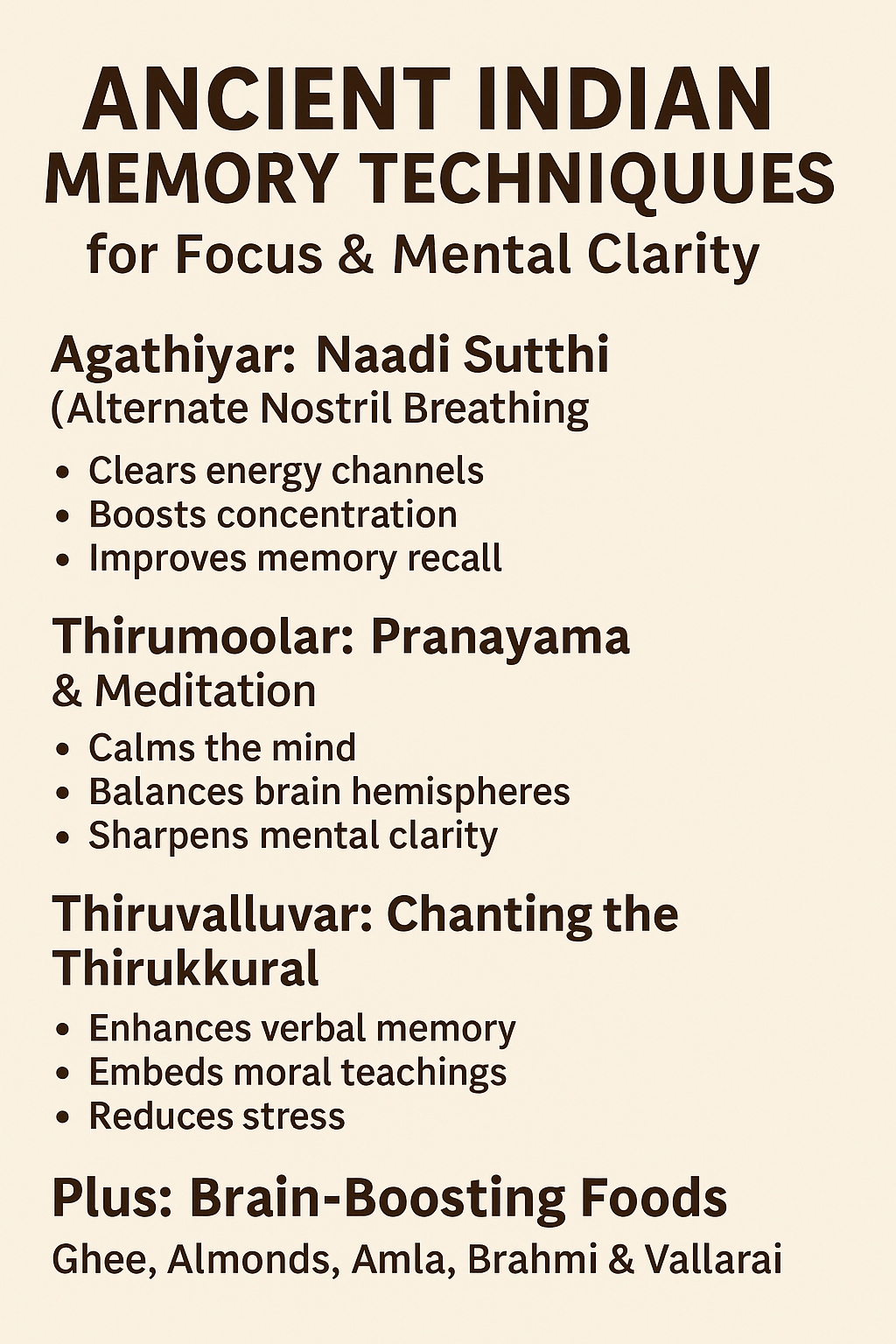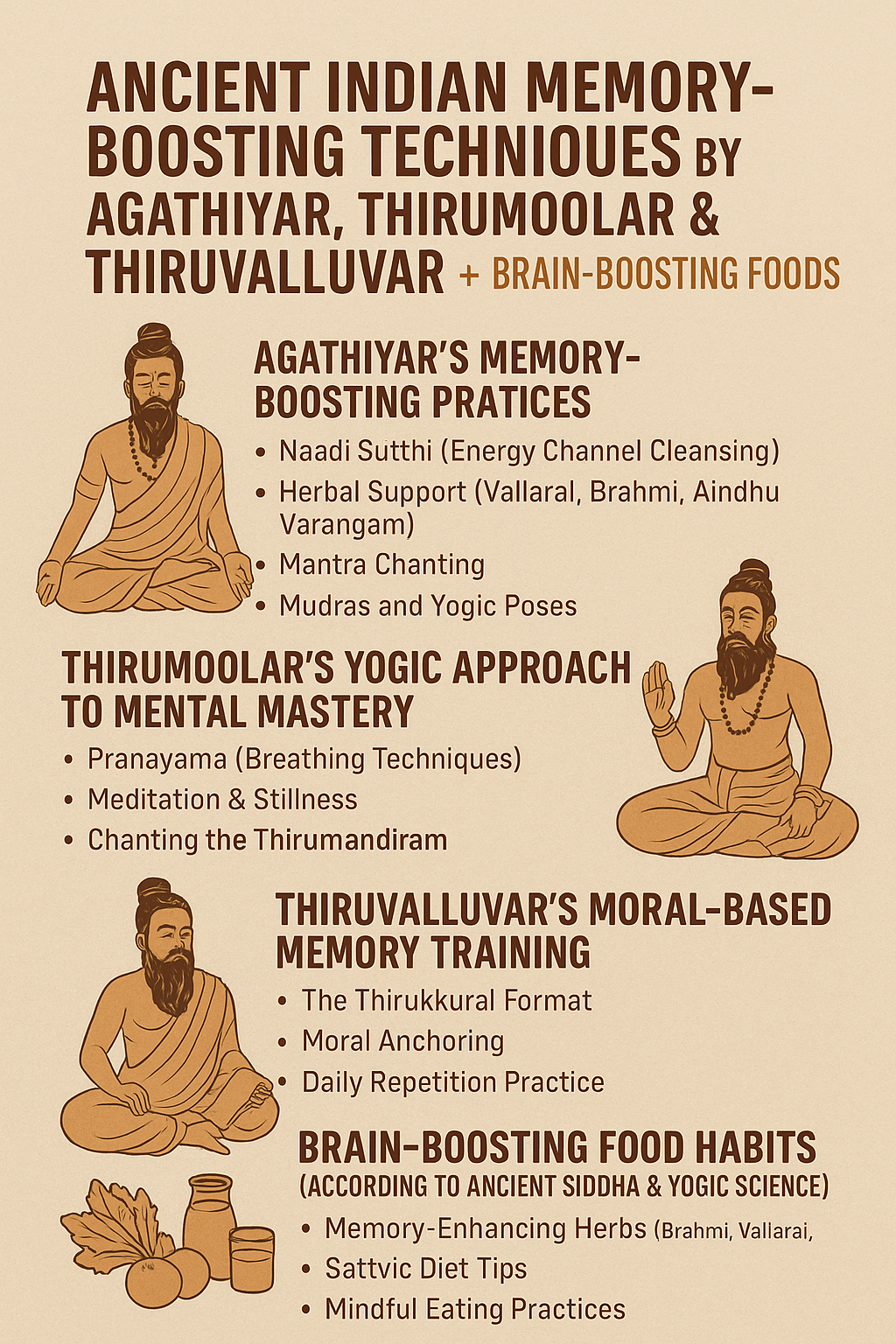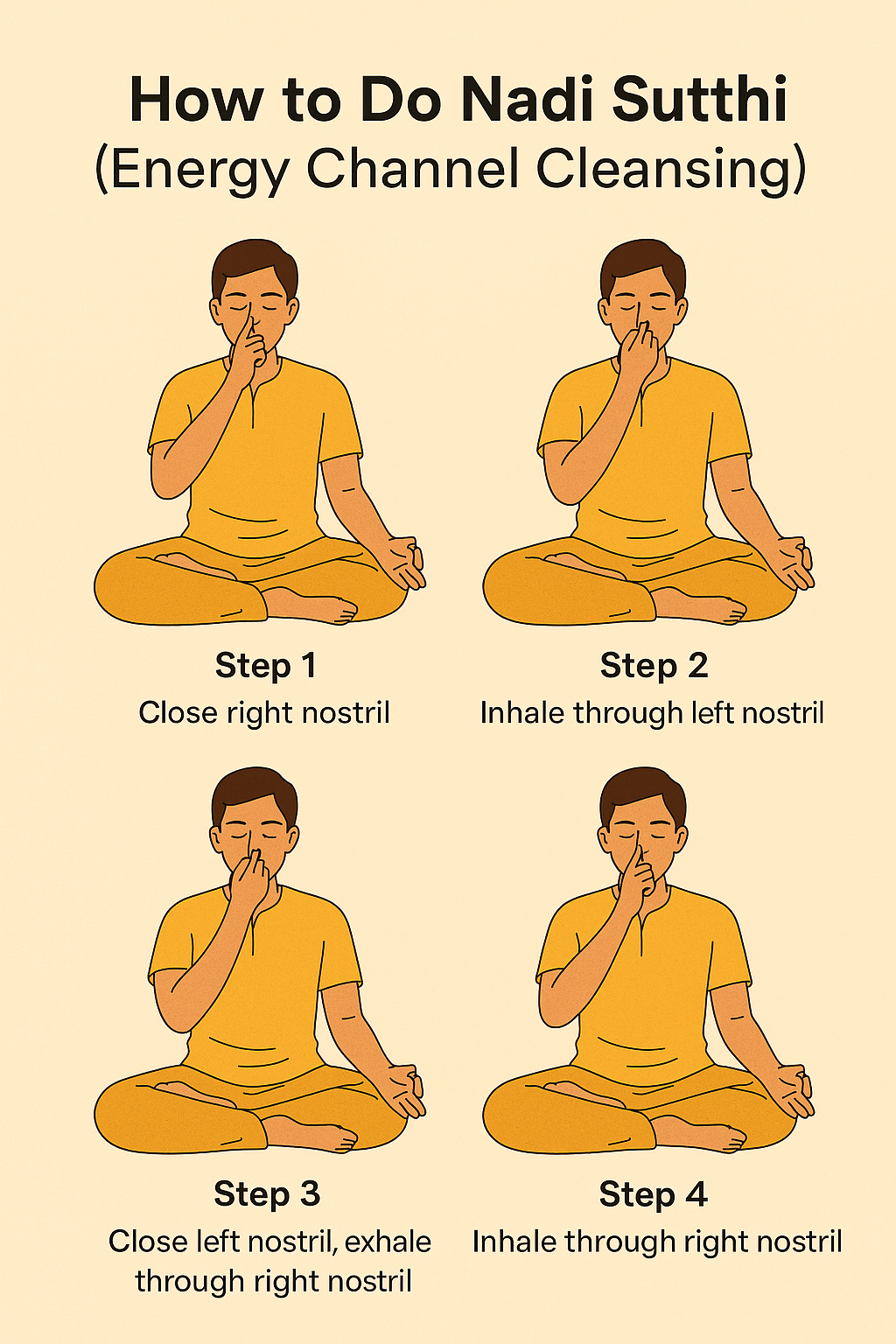Table of Contents
ToggleIntroduction:

Ancient Indian memory techniques have long offered a natural, holistic approach to improving focus, learning, and mental clarity. Developed by legendary Tamil sages such as Agathiyar, Thirumoolar, and Thiruvalluvar, these methods combine breathing exercises, meditation, mantra chanting, and herbal nutrition to enhance memory and reduce stress without relying on modern stimulants or technology.
At a time when students and professionals alike face overwhelming distractions, these ancient Indian Memory Techniques serve as timeless tools to unlock the brain’s true potential. In this blog post, you’ll discover how these sacred teachings—rooted in Siddha and yogic wisdom—can be easily integrated into modern life to help learn faster, remember longer, and think more clearly.
The Wisdom of Ancient Sages: Memory Techniques
Ancient Indian wisdom offers a holistic approach to mind and body, with profound insights into sharpening the intellect and strengthening memory.
A. Agathiyar: The Father of Siddha Medicine & Yoga
Agathiyar, a revered Siddhar, is considered the progenitor of Siddha Medicine and a significant contributor to Yoga. His teachings emphasize the interconnectedness of mind, body, and spirit for optimal health, including cognitive enhancement.
A revered Siddha and yogi, Agathiyar is known as the father of Tamil Siddha medicine. His works focus on health, herbs, mantra science, and energy pathways in the human body.
B. Thirumoolar: The Architect of Yoga and Tantra
Thirumoolar, through his magnum opus Thirumandiram, laid down foundational principles of Yoga and Tantra. His insights provide practical ways to enhance memory and brain health through physical and mental discipline.
A Shaiva yogi and author of the Thirumandiram, Thirumoolar emphasized the power of yoga, breath control (pranayama), and inner silence for physical and mental transformation.
Thiruvalluvar: The Moral Compass and Master of Practical Wisdom
Thiruvalluvar, author of the Thirukkural, provides a moral compass and practical wisdom for righteous living, which indirectly yet profoundly impacts memory and cognitive abilities. His philosophy emphasizes discipline and ethical conduct as prerequisites for a sharp mind .The great Tamil poet and philosopher behind the memory-enhancing structure, still memorized by students across generations.
Agathiyar’s Memory-Boosting Technique: Naadi Sutthi (Energy Channel Cleansing)
Pranayama (Breath Control): Agathiyar’s lineage highlights the power of breath. Specific breathing exercises like Anulom Vilom (alternate nostril breathing) and Bhramari (humming bee breath) are central to his teachings. These forms of Pranayama enhance oxygen flow to the brain, improve concentration, calm the mind, and significantly contribute to better memory retention and recall.
Meditation/Dhyana: Agathiyar placed a strong emphasis on meditative practices for achieving mental clarity and improving memory. Regular Dhyana can quiet the chatter of the mind, allowing for greater focus and easier access to stored information.
Herbal Formulations (brief mention): While we’ll dive deeper into foods, it’s worth noting Agathiyar’s vast knowledge of medicinal plants. Many of his formulations were designed to support cognitive health, laying a foundation for the brain-boosting foods concept
Why Practice Naadi Sutthi (Alternate Nostril Breathing)?
According to Agathiyar’s teachings, prana (life energy) and mind flow together. By consciously balancing the breath through each nostril, you activate both the logical and intuitive hemispheres of the brain, allowing Sushumna—the spiritual channel—to open. This leads to:
Sharper memory and improved learning capacity
- Reduced stress and anxiety
- Enhanced oxygen flow to the brain
- Greater emotional balance
- Deeper meditation and inner stillness
How to Practice Naadi Sutthi – Step-by-Step
How It Enhances Memory (Agathiyar’s Insight)
Agathiyar taught that the synchronization of breath channels leads to the unblocking of mental pathways:
Ida Naadi governs calmness and clarity
Pingala Naadi provides mental vitality and energy
Sushumna Naadi, when activated, awakens higher cognition, memory retention, and spiritual intelligence
When practiced regularly, Naadi Sutthi becomes a powerful tool not just for mental alertness, but for inner alignment and stress-free learning.
Siddha Herbs for Memory
Agathiyar emphasized the power of herbal support in brain health:
Vallarai (Gotu Kola) – Improves circulation and boosts memory.
Brahmi – Supports cognition and reduces brain fog
Amla (Indian Gooseberry) – Rich in antioxidants, promotes nerve health
Thirumoolar: The Architect of Yoga and Tantra
Thirumoolar, through his magnum opus Thirumandiram, laid down foundational principles of Yoga and Tantra. His insights provide practical ways to enhance memory and brain health through physical and mental discipline.
- Asanas (Yoga Postures): Thirumoolar’s teachings implicitly support the idea that certain Yoga Asanas can improve blood circulation to the brain, thereby enhancing cognitive function. Postures like Sirsasana (headstand), Sarvangasana (shoulder stand), and Paschimottanasana (seated forward bend) are traditionally believed to increase blood flow and nourish brain tissues. (Note: These advanced poses should only be practiced under the guidance of a qualified yoga instructor.)
- Mudra (Hand Gestures): Thirumoolar’s work also touches upon the use of specific Mudras. Hand gestures like Gyana Mudra (Mudra of Knowledge) and Varun Mudra (Mudra of Water) are believed to stimulate different parts of the brain and nervous system, aiding mental focus and memory.
- Mantra Chanting: The rhythmic recitation of Mantras, as prescribed by Thirumoolar, is a powerful tool for concentration and memory retention. The vibrations and focus required for chanting can quiet the mind and improve neural pathways.
Siddhar Thirumoolar, one of the greatest Tamil yogis and author of the sacred text Thirumandiram, emphasized that true intelligence and memory arise from a disciplined inner life. His teachings combined controlled breathing, deep meditation, and rhythmic chanting—designed to calm the mind, sharpen focus, and unlock inner clarity.
Benefits from Thirumoolar’s Yogic Practices
| Practice | Primary Benefit | Mental Effect |
| Brahmari Pranayama | Calms the nervous system | Increases focus and creativity |
| Anulom Vilom | Balances brain hemispheres | Sharpens memory and mental clarity |
| Silent Meditation | Trains inner stillness | Enhances concentration and reduces anxiety |
| Chanting Thirumandiram | Rhythmic learning | Strengthens memory recall and understanding |
Thiruvalluvar’s Moral-Based Memory Training
Thiruvalluvar, author of the Tirukkural, provides a moral compass and practical wisdom for righteous living, which indirectly yet profoundly impacts memory and cognitive abilities. His philosophy emphasizes discipline and ethical conduct as prerequisites for a sharp mind.
1. Ethical Living & Discipline (Aram):
Thiruvalluvar’s core principle of Aram (virtue or righteous conduct) suggests that a disciplined mind, free from distractions, negative thoughts, and vices, is inherently sharper and more capable of memory. Mental clutter and emotional turmoil can significantly impair recall.
2. Concentration and Focus:
The Tirukkural contains couplets that subtly emphasize the importance of single-minded focus for learning and retention. A mind that can concentrate deeply is naturally more adept at acquiring and recalling information.
3. Continuous Learning: Thiruvalluvar advocates for lifelong learning. The act of continuously acquiring knowledge and engaging the mind in intellectual pursuits keeps the brain active and resilient and improves its capacity for memory over time.
Brain-Boosting Food Habits (According to Ancient Siddha & Yogic Science)
1. Memory-Enhancing Herbs
Brahmi (Bacopa Monnieri) – Promotes alertness and comprehension
Vallarai (Centella Asiatica) – Improves memory and brain circulation
Amla (Indian Gooseberry) – Rich in antioxidants, supports nerve health
2. Sattvic Diet Tips
Include cow’s milk, almonds soaked overnight, ghee, fruits, and moong dal in daily meals.
Avoid tamasic foods like fried, spicy, or preserved items that slow down mental clarity.
3. Mindful Eating Practices
Eat in silence and gratitude
Avoid eating while watching TV or scrolling on phones
Chew food slowly to improve digestion and prana absorption
Lifestyle Tips from Tamil Siddhars
| Practice | Benefit |
| Wake up at Brahma Muhurtham (4–6 AM) | Improved alertness and peace |
| Chant daily (Kural, Mantra) | Emotional balance and mental clarity |
| Do Trataka (candle gazing) | Boosts concentration and memory |
| Walk barefoot on natural surfaces | Grounding and brain recalibration |
Conclusion
The teachings of Agathiyar, Thirumoolar, and Thiruvalluvar offer more than just memory improvement—they guide us toward mental harmony, self-awareness, and lifelong learning. By practicing simple yet powerful tools like Naadi Sutthi, Pranayama, silent meditation, and rhythmic chanting, we not only sharpen our cognitive abilities but also align with our deeper inner self.
Combined with the right food and lifestyle—rooted in ancient Indian wisdom—these techniques are timeless. In a world full of distractions, returning to these holistic practices reminds us that true intelligence comes not from pressure or technology, but from balance, breath, and presence.
Now is the perfect time to reconnect with these sacred tools, not just to remember more—but to live with more clarity, purpose, and peace.




Pingback: 81. Super Brain Yoga: Unlocking Your Mind’s Full Potential
Thanks